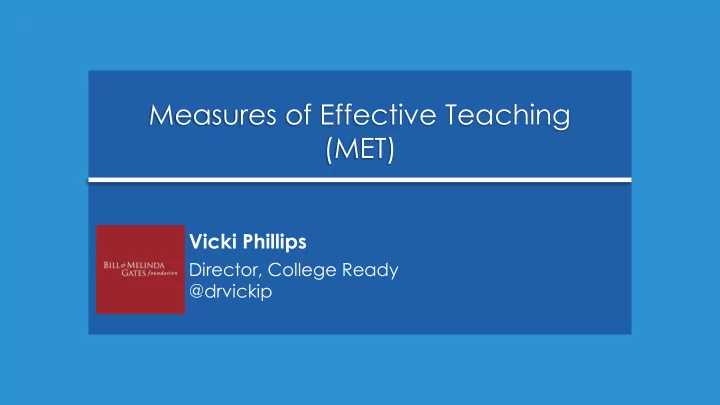

Measures of Effective Teaching (MET) Vicki Phillips Director, College Ready @drvickip
Teaching Learning Evidence Underpinned by: Innovation Advocacy Partnerships
Why did we choose to focus on teaching ?
The impact of teachers is undeniable. Students with highest-performing teachers (top 20%) 100 Student performance by percentile 90 80 53 percentage 70 point gap in 3 60 years! 50 40 30 Top-quartile teachers 20 10 Bottom-quartile teachers Age 8 Age 9 Age 10 Age 11 Students with lowest-performing teachers (bottom 20%)
What gets in the way? Teacher isolation impedes skill and strategy development Teachers need far more opportunities to engage in collaborative analysis of teaching Teachers need far more growth-oriented feedback than they receive Our proxies for effectiveness are outdated
Why start with measurement? Elevated teaching Improved student profession outcomes Strategic Targeted Meaningful placement of support & PD retention teachers Differentiated Useful and actionable feedback roles Multiple measures of effectiveness
What we knew …(U.S.) Master’s degrees are NOT related to student learning Certifications DON’T make a difference After three years seniority DOESN’T really matter Past performance has HUGE value
…and is the best predictor. Average Percentile Point Gain Past Performance Math Major Alternative Certifications Masters Degree In Education -1 0 1 2 3 4 5 6 7 8 9 10
Teaching is both an art and a science.
Fair, respectful development and evaluation systems that teachers could trust.
We invested in two simultaneous approaches. MET Project 2009 2012 2016 Partnership Sites to Empower Effective Teaching
The MET Project is unique… in the variety of indicators tested, 5 instruments for classroom observations • Student surveys (Tripod Survey) • Student growth on state tests • Teacher content knowledge • Classroom conditions • in its scale , 3,000 teachers • 22,500 observations scores (7,500 lesson videos x 3 scores) • 900+ trained observers • 44,500 students completing surveys and supplemental assessments • 3,120 additional observations by principals/peer observers in Florida • in the variety of student outcomes studied, Gains on state math and ELA tests • Gains on supplemental tests (BAM & SAT9 OE) • Student-reported outcomes (effort and enjoyment in class) • and, in the random assignment of teachers.
+ Evidence Wisdom of Practice
A set of school districts led the way. Improving teacher evaluation systems Strengthening Pittsburgh teacher supports Prince George’s Denver County Strategic Memphis staffing for Los Angeles Charter Tulsa Network student Atlanta success Recognizing Hillsborough and rewarding County effective teaching
Results
We can clearly & fairly identify effective teachers. Key Findings: The teachers who demonstrated greater measured effectiveness in Year 1 and were randomly assigned in Year 2 did produce higher student achievement. The magnitude of the impacts were consistent with predictions. They also produced higher achievement on supplemental (more performance and conceptually based) assessments as well as state tests.
There is a clear path to high-quality classroom observations. 1 2 3 4 Determine Define Ensure Ensure ALIGNMENT EXPECTATIONS OBSERVER RELIABILITY WITH FOR TEACHERS ACCURACY OF RESULTS OUTCOMES Tools: Validation engine Certification tool for observers
Some assumptions were validated; some proved wrong. Adding an observation by a second observer increases reliability twice as much as having the same observer score an additional lesson. Short observations provide a time-efficient way to incorporate more than one observer per teacher. School leaders rate their own teachers higher than do outside observers. However, (1) their ratings are highly correlated with others and (2) administrators discern bigger differences between teachers than peers do (which increases reliability). Letting teachers choose which lessons are observed does not make it harder to identify the teachers who are struggling. In fact, it is easier. Assessments of teacher knowledge as currently configured are not predictive of performance
Student perceptions matter . Sample survey questions:
There is power in the combination. Potential for Predictive Measure Reliability Diagnostic Power Insight Measures of Student Growth Student survey / Observation
Impact
Major policy shifts have occurred. 37 39 Number of states that have Number of states that 43 made teacher evaluation policy require observations as part changes since 2009. of teacher evaluations. Number of states that 25 30 require annual evaluations of all new teachers. Number of states that require Number of states that teacher evaluation systems to require teacher evaluations include multiple categories of to include objective rating teacher performance. evidence of student learning.
Evaluation systems are becoming more improvement-focused. Measure Effective Teaching Set expectations Use multiple measures Balance weights Invest in Improvement Ensure High-Quality Data Make meaningful distinctions Monitor validity Prioritize support and feedback Ensure reliability Use data for decisions at all levels Assure accuracy
Professional Development is becoming more focused and innovative. Focus • Models • Tools • Networks •
The research gave us clues.
Observation Score Distributions: UTOP
Seeing what others do is growth producing . New technologies can aid in conducting multiple observations and can help make isolation a thing of the past….. Video taping one’s practice Forming video clubs for collaborative analysis Annotating video for collaborative discussion MET camera Social networks expand the capacity for wide ranging, growth oriented feedback.
New models and tools are emerging. Teaching Channel
New models and tools are emerging. PD 360 o TeachScape BloomBoard
New models and tools are emerging. Ear Bud Coaching TeachLive MyLivePD
New networks are forming and teachers are leading the way.
Change the game! Work the curve! Source: TNTP
What we choose to focus on matters.
Thank you! @drvickip
Recommend
More recommend